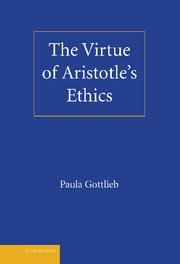Appendix: Uniting the “Large-scale” Virtues
Published online by Cambridge University Press: 29 September 2009
Summary
As explained in Chapters 5 and 8, Aristotle does not think that it is possible to have any one ethical virtue fully without having all the others. Practical wisdom requires all the ethical virtues, and they require practical wisdom. While the thesis works especially well for the nameless virtues, it has often been objected that this requirement is too strong, because on Aristotle's own view, it seems possible to lack the wealth necessary for exercising magnificence or to lack the social milieu for exercising magnanimity, so that one can have some virtues without even being able to develop others. According to this argument, one can have the small-scale ethical virtues of generosity and the virtue concerning honour on a small scale without having the large-scale virtues of magnificence and magnanimity, although one cannot have the latter without having the former.
This problem has exercised philosophers at least since Aquinas, who is the first to finesse the issue with the suggestion that someone who is poor but has practical wisdom is “so disposed that he may become munificent [magnificent] when he has matter for the virtue”. But this goes against Aristotle's view that we need to practise the actions relevant to each particular virtue in order to attain the virtuous disposition itself. It also concedes that one can have practical wisdom without having all the ethical virtues.
Various solutions have been canvassed, restricting or re-describing the scope of Aristotle's thesis about the unity of the ethical virtues.
- Type
- Chapter
- Information
- The Virtue of Aristotle's Ethics , pp. 215 - 218Publisher: Cambridge University PressPrint publication year: 2009



